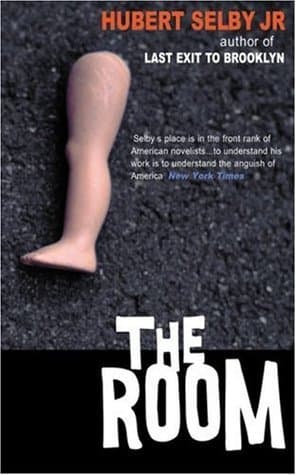
Book Review Summary: The Room
Introduction
"The Room" is a novel written by Hubert Selby Jr., an American author known for his uncompromising and provocative works. Published in 1971, the book has gained a reputation as one of the most disturbing and challenging works of literature. This article will provide an analysis of the book's views, reasons for recommendation and not recommendation, and a conclusion summarizing the key points.
About Hubert Selby Jr.
Hubert Selby Jr. was born in Brooklyn and faced numerous health challenges throughout his life. After being written off as a goner by doctors, he decided to pursue a career in writing. Drawing inspiration from his Brooklyn neighborhood, Selby began writing "The Queen Is Dead," which evolved into his first novel, "Last Exit to Brooklyn" (1964). Considered a groundbreaking work, "Last Exit to Brooklyn" explores themes of sexuality, violence, and social alienation. Selby's second novel, "The Room," published in 1971, is often regarded as his masterpiece. It is a claustrophobic descent into the protagonist's tormented soul, trapped in a loveless society.
Analysis of Views
- Uncompromising and Repetitive: "The Room" is known for its uncompromising and repetitive nature. The story revolves around a small-time criminal who surrenders to sadistic fantasies of hatred and revenge while confined to his remand cell. Selby's writing style is stark and bleak, with a focus on the protagonist's obsessive thoughts and fantasies. The book's repetitive nature can be both challenging and frustrating for readers.
- Disturbing and Graphic: The book contains disturbing and graphic content, including explicit sexual passages and violent scenes. Some readers find the book's explicit nature unsettling, as it pushes the boundaries of what is considered acceptable in literature. The graphic descriptions of violence and abuse can be challenging for sensitive readers.
- Philosophical and Anti-Authoritarian: "The Room" offers a philosophical exploration of one-man's hopeless view of the universe. Selby critiques authoritarianism and the justice system in America, expressing his dissatisfaction with the current state of society. The book's anti-authoritarian stance resonates with readers who share similar views.
- Masterful Writing: Despite its challenging nature, "The Room" is praised for its masterful writing style. Selby's ability to convey the protagonist's thoughts and emotions through stream-of-consciousness narration is highly regarded. His use of vivid imagery and realistic dialogue adds depth to the story.
- Anti-Hero and Anti-Climax: The protagonist of "The Room" is often described as an anti-hero who embarks on a self-delusional crusade against abuse in the justice system. While some readers find this character compelling, others feel that the book lacks a clear resolution or climax. The anti-hero's journey may leave readers feeling unsatisfied or disconnected from the story's outcome.
Reasons for Recommendation
- Challenging and Thought-Provoking: Readers recommend "The Room" for its challenging and thought-provoking nature. The book pushes readers to confront their own biases and question societal norms, making it a valuable addition to any literary collection.
- Brilliant Writing Style: Selby's writing style is highly praised for its originality and ability to transport readers into the protagonist's mindset. His use of stream-of-consciousness narration adds depth to the story and immerses readers in the protagonist's world.
- Exploration of Taboo Topics: "The Room" delves into taboo topics such as sexuality, violence, and abuse, making it a controversial and thought-provoking read. Readers appreciate the book's willingness to tackle these sensitive subjects head-on, even if it means confronting their own discomfort or disgust.
- Philosophical Insights: The book offers philosophical insights into human nature, morality, and the justice system. Readers appreciate the opportunity to reflect on these complex issues and engage in meaningful discussions about society's shortcomings.
- Unique Perspective: "The Room" provides a unique perspective on the human condition, offering readers a glimpse into the mind of a troubled individual trapped in a loveless society. The book's exploration of one man's descent into madness resonates with readers who appreciate unconventional narratives.
Reasons for Not Recommendation
- Disturbing Content: Some readers find "The Room" too disturbing or graphic, particularly due to its explicit sexual passages and violent scenes. The book's explicit nature may not be suitable for all readers, especially those who prefer more conventional literature.
- Lack of Resolution: Critics argue that "The Room" lacks a clear resolution or climax, leaving readers feeling unsatisfied or disconnected from the story's outcome. The anti-hero's journey may not provide enough closure or catharsis for some readers.
- Repetitive Nature: The repetitive nature of "The Room" can be challenging for some readers, particularly those seeking more linear storytelling or looking for a more engaging narrative structure. The book's repetitive elements may detract from its overall impact on readers.
- Anti-Climax: Some readers find the book's anti-climax disappointing, as it fails to deliver a satisfying resolution or climax that would have provided closure to the story's events. The lack of resolution may leave readers feeling unfulfilled or frustrated with the overall narrative arc.
- Personal Preferences: Personal preferences play a significant role in determining whether or not someone recommends "The Room." Some readers may find the book's style or subject matter unappealing or uninteresting, regardless of its literary merits or philosophical insights.
Conclusion
"The Room" by Hubert Selby Jr. is a challenging and thought-provoking novel that delves into themes of despair, revenge, and societal decay. While it has garnered critical acclaim for its masterful writing style and philosophical insights, it also pushes boundaries with its explicit content and repetitive narrative structure. Readers recommend it for its ability to provoke thought-provoking discussions and offer unique perspectives on human nature and society's shortcomings. However, some readers find the book too disturbing or lacking in resolution, which may detract from their overall experience reading it. Ultimately, whether or not one recommends "The Room" depends on individual preferences and willingness to engage with controversial and challenging literature that pushes boundaries and challenges societal norms.